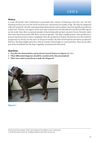 34 citations,
March 2003 in “Veterinary Dermatology”
34 citations,
March 2003 in “Veterinary Dermatology” Most dogs with alopecia had higher than normal levels of certain hormones, but hair loss might not always be linked to these hormone changes.
April 2018 in “Blackwell's Five‐Minute Veterinary Consult Clinical Companion” Some skin conditions in pets can signal cancer or may develop into cancer, and monitoring or treating these can help detect or manage the disease.
44 citations,
August 2010 in “The veterinary clinics of North America. Exotic animal practice” Insulinomas and adrenocortical tumors are common in older ferrets, diagnosed with blood tests and ultrasounds, and treated with medications or surgery.
 48 citations,
March 1997 in “Veterinary Dermatology”
48 citations,
March 1997 in “Veterinary Dermatology” Some cats with sudden hair loss and tiredness might have cancer-related alopecia.

Accurate diagnosis and tailored treatments are crucial for managing hair loss in humans and animals.
 15 citations,
September 2005 in “The Journal of the American Animal Hospital Association/Journal of the American Animal Hospital Association”
15 citations,
September 2005 in “The Journal of the American Animal Hospital Association/Journal of the American Animal Hospital Association” Trilostane effectively treated hair loss in Alaskan Malamutes with no adverse effects.
 May 2019 in “Small Animal Dermatology”
May 2019 in “Small Animal Dermatology” The dog has Color Dilution Alopecia, causing hair loss and increased risk of skin infections.
 December 2018 in “Journal of Advances in VetBio Science and Techniques”
December 2018 in “Journal of Advances in VetBio Science and Techniques” Low testosterone might be a common cause of hair loss in male dogs.
 May 2019 in “Small Animal Dermatology”
May 2019 in “Small Animal Dermatology” The cat had a rare condition linked to cancer, leading to its euthanasia.
 2 citations,
March 2019 in “Veterinary dermatology”
2 citations,
March 2019 in “Veterinary dermatology” Thymoma in cats can cause hair loss without inflammation.
 1 citations,
January 2008 in “Elsevier eBooks”
1 citations,
January 2008 in “Elsevier eBooks” The document concludes that various disorders can cause hair loss in dogs, each requiring different treatments, and some may heal on their own.
 10 citations,
July 2014 in “Veterinary dermatology”
10 citations,
July 2014 in “Veterinary dermatology” Deslorelin may help intact male dogs regrow hair from alopecia X, with a 75% success rate and no side effects.
 January 2006 in “Elsevier eBooks”
January 2006 in “Elsevier eBooks” Cats with Feline Symmetrical Alopecia can regrow hair with proper treatment based on the specific cause, including diet, medication, or stress management.
March 2023 in “Epilepsia” Trilostane may help delay epilepsy development by increasing certain brain chemicals.
 21 citations,
May 2005 in “Journal of the American Veterinary Medical Association”
21 citations,
May 2005 in “Journal of the American Veterinary Medical Association” The exact cause of growth hormone-responsive alopecia in dogs is unclear.
 8 citations,
February 2005 in “Veterinary dermatology”
8 citations,
February 2005 in “Veterinary dermatology” Chesapeake Bay retrievers' hair loss is likely a breed-specific, hereditary condition linked to abnormal steroid levels and distinct skin changes.
 April 2008 in “Companion Animal”
April 2008 in “Companion Animal” The cat's skin condition was linked to cancer and did not improve with treatment, leading to a poor outcome.
 January 2020 in “Frontiers in Medical Case Reports”
January 2020 in “Frontiers in Medical Case Reports” A dog developed skin issues from too many steroids, but reducing steroids and using a specific treatment fixed the problems.
 3 citations,
May 2018 in “The Journal of the American Animal Hospital Association/Journal of the American Animal Hospital Association”
3 citations,
May 2018 in “The Journal of the American Animal Hospital Association/Journal of the American Animal Hospital Association” Deslorelin implants successfully treated hair loss in two male Keeshonden dogs.
 5 citations,
July 1994 in “PubMed”
5 citations,
July 1994 in “PubMed” Finasteride, when taken daily, lowers dihydrotestosterone levels but doesn't noticeably affect adrenal steroid production, except by blocking the 5 alpha-reductase enzyme.
 4 citations,
October 1998 in “In Practice”
4 citations,
October 1998 in “In Practice” The conclusion is to thoroughly test for causes of cat hair loss and treat accordingly, considering medication only after serious conditions are ruled out.
 4 citations,
January 2009 in “Wiley-Blackwell eBooks”
4 citations,
January 2009 in “Wiley-Blackwell eBooks” The book explains causes, diagnosis, and treatments for hair loss in pets.
 7 citations,
January 1996 in “In Practice”
7 citations,
January 1996 in “In Practice” The document concludes that a thorough examination and various tests are crucial for diagnosing and treating ear inflammation in pets.
 11 citations,
January 2007 in “Veterinary dermatology”
11 citations,
January 2007 in “Veterinary dermatology” Fulvestrant at 10 mg/kg does not promote hair regrowth in dogs with alopecia X.
 23 citations,
August 2012 in “Veterinary dermatology”
23 citations,
August 2012 in “Veterinary dermatology” Skin infections in cats are more common than thought, often affect young cats with allergies, and need better treatments.
 9 citations,
November 2014 in “Journal of feline medicine and surgery”
9 citations,
November 2014 in “Journal of feline medicine and surgery” Lymphocytic mural folliculitis in cats might be an early sign of pancreatic cancer.
 18 citations,
October 2002 in “Veterinary dermatology”
18 citations,
October 2002 in “Veterinary dermatology” Five Weimaraners had a milder form of color dilution alopecia causing hair loss and skin issues.
 1 citations,
April 2023 in “Journal of the Hellenic Veterinary Medical Society”
1 citations,
April 2023 in “Journal of the Hellenic Veterinary Medical Society” Most dogs with paw inflammation had chronic issues, often due to allergies, and certain breeds were more affected.
 May 2024 in “Clinical Cosmetic and Investigational Dermatology”
May 2024 in “Clinical Cosmetic and Investigational Dermatology” Manipulating cell cleanup processes could help treat hair loss.

The document concludes that non-endocrine alopecia in pets varies in treatment effectiveness and often has a poor prognosis, especially in cats.



























